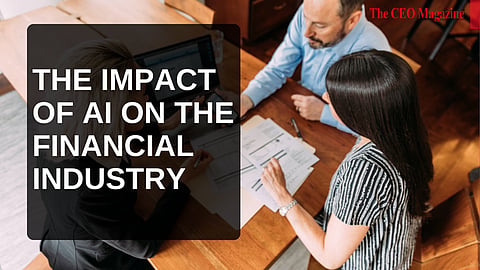The Impact of AI on the Financial Industry
The Impact of AI on the Financial Industry
AI—two letters, shaking up the world; doubts regarding their holding in the financial industry can be counted on one's fingers. From everyday banking to head-scratching investment strategies, AI finds its way into the fabric that makes our financial lives. Let's take a peek to see exactly how this tech wizardry changes things.
AI: Your New Financial BFF?
Remember those old science fiction movies where computers were smarter than humans? We aren't at that point yet, but AI is getting pretty darn close. And it's making our financial lives a whole lot easier.
Take banking, for instance. Remember queuing for hours in the bank? The paperwork? Now, thanks to AI, one can manage one's money by tapping into a phone a few times. Bots like Bank of America's Erica have handled over one billion customer interactions in the first five years, answering questions, and helping people manage their finances. It's like having a personal financial assistant, 24/7.
Convenience isn't the only factor at play here, though. AI is also making banks more efficient. According to estimates from one of the large-name consultancy firms, McKinsey and Co., AI could increase productivity in banking by 5 percent. That's huge. That means more money for research and development, and hopefully better interest rates for us.
Investing Smarter with AI
AI is also transforming the investment world. Powered by AI, Robo-advisors are now providing personalized investment advice at a fraction of the cost of financial advisors. Such AI-driven platforms analyze your financial goals, risk tolerance, and investment preferences to create a customized portfolio. It's like having a super-smart financial advisor at your beck and call.
It's not only the individual investor, either. Artificial intelligence is used by hedge funds and other large players to analyze reams of data for trends and better investment decisions, and it has proven a game-changer.
Even in a long list of crypto casinos, AI is coming into play. These platforms make use of AI to advance player experiences, detect fraud, and even develop new games. It's a pretty interesting intersection where technology meets entertainment.
AI: The Human Touch
Now, don't get this wrong. AI is great and all, but there's still a chink or two left open for humans in the financial world. Craig Bright, Group Chief Information Officer at Barclays, has phrased this sentiment just right with these words: "AI doesn't mean letting go of the human side of our services – instead, we aim to give our customers the convenience of a digital experience with the comfort of a personal touch."
AI handling the number-crunching and the routine tasks will leave human beings doing what they do best: building relationships, offering expert advice, and that personal touch that customers crave.
The Dark Side of AI
Of course, the biggest of these concerns would have to be job loss. Since AI can independently take up any routine task, there is an apprehension that too many jobs in the financial sector may become redundant. It is believed that although some jobs could go, it is equally possible that new roles might arise from this entire change in the industry.
Another huge problem is that of bias. Since AI systems have huge amounts of data to be trained on, if that data is biased, the AI system will also be. Such bias could then result in prejudicial decisions about unfair lending practices and other harmful outcomes associated with credit financing and investment. Thus, there has to be a development of AI systems that are truly fair, transparent, and accountable.
Cybersecurity is another major challenge. With the increasing sophistication of AI, so are cyber threats. AI-borne attacks may very well include stealing sensitive financial data, disrupting the financial markets, or even manipulating financial systems. All these would require vigilance and innovation to ward off.
Striking a Balance
We must find a balanced position concerning the benefits and risks of AI. This involves investing in education and training for workers to adapt to the evolving labor market, developing ethics that will guide AI development and hardening cybersecurity.
Regulations are equally important. Governments and regulators have to keep up with AI developments at breakneck speeds while ensuring appropriate consumer safeguards and those of the financial system.
The Future is AI (But It's Complicated)
Though intermixed with challenges to be conquered, the future of finance is undoubtedly intertwined with AI. The potential benefits are just too great to turn a blind eye to. We can all work together to harness the power of AI for a more efficient, inclusive, and secure financial system.
While it may sound like the synopsis of a science fiction movie, the fact is that AI is already changing the world of finance. The reality is complex and ever-changing, but it's worth another look. After all, who wouldn't want to live in a time when super-intelligent machines can handle our financial lives? That is, as long as those are ethical and safe ones.
Conclusion
AI is undoubtedly changing the face of finance. From smoothening out banking processes to powering sophisticated investment strategies, its impact cannot be denied. While it holds immense potential for efficiency, personalization, and growth, it is very important to have a critical eye on AI.
Indeed, dealing with concerns like job displacement, bias, and cybersecurity is indispensable in harnessing all the benefits brought about by AI. The appropriate mix of human judgment and artificial intelligence shall follow through with the advancing technology to ensure a robustly fair future in terms of finances.
Whether you're a tech enthusiast or someone looking to wring out the most value for your dollar, now is the time to jump on board the AI bandwagon. It's the future, and it's here to stay.
Follow us on Google News


